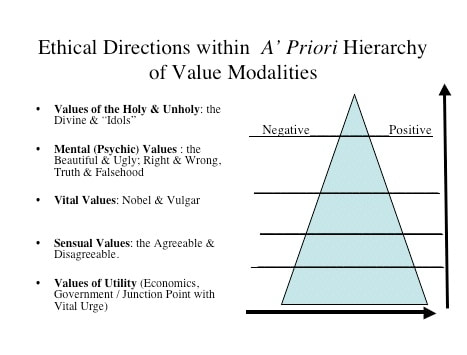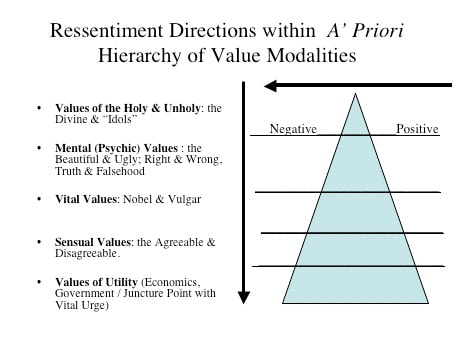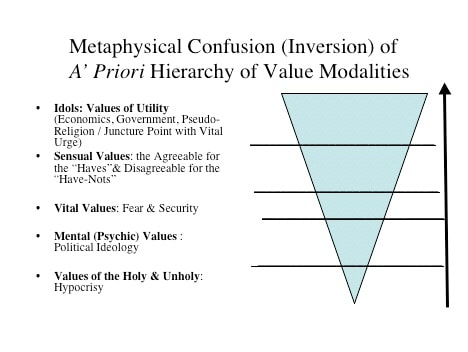In Ressentiment, Max Scheler agrees with Friedrich Nietzsche's claim that Ressentiment values result in a descent and deterioration of the individual and society away from higher-positive values to lower-negative values, but Scheler disagrees with Nietzsche regarding the source of Ressentiment. Unlike Nietzsche, who believes Ressentiment stems from slave morality embedded within Christianity, Scheler expertly argues that the actual source of Ressentiment values is bourgeois morality. Scheler essentially attests that the roots of liberalism and leftism are to be found there and not, as Nietzsche presumed, in Christianity. Nevertheless, though Ressentiment originated in bourgeois morality, Scheler admits it did gradually seep into Christianity, tainting and eventually usurping original Christian values through the centuries until it found its ultimate expression in the French Revolution in 1789.
In the following, I present a brief outline of Scheler’s views concerning the corrupting influence of Ressentiment values which, in their purest form, results in Metaphysical Confusion and, ultimately, Value Delusion. I am firmly convinced, as are many others, that our contemporary world suffers from an acute case of both. The following may help shed light on at least some aspects of our current societal malaise. Though much of the following information is not new or groundbreaking, it is my hope that exploring Scheler's ideas here might help clarify some of the confusion concerning the dominant Metaphysical Confusion of our own times.
In order to understand Nietzsche's concept of Ressentiment properly, it must be shown in relation to the apriori hierarchy of value modalities, which Scheler regards as emotively experienced and universal, objective, and constant. From lowest to highest these modalities (with their respective positive and corresponding negative forms) are as follows: sensual values of the agreeable and the disagreeable; vital values of the noble and vulgar; mental (psychic) values of the beautiful and ugly, right and wrong and truth and falsehood; and finally spiritual values of the Holy and unholy of the Divine and idols.
Scheler argues that this apriori hierarchy of value modalities best represents Christian ethics and morality (at least in the ideal, traditional form) as it is modeled upon a belief in Divine creation and the existence of a personal, loving God. For individuals or societies living life within such a framework, the ethical, psychological, and spiritual issue becomes how the energy from these feeling states will be channeled so as to better benefit the individual person and society. Hence, an adulterated Christian hierarchy of ethics and values cannot, as Nietzsche argues, be the source of resentment values. Thus, it is a framework built upon what Scheler describes as Positive Value.
According to Scheler, Ressentiment is highly situational in character because it always involves "mental comparisons" (value-judgments) with other people who allegedly possess no such Ressentiment feelings and who simultaneously exhibit authentic positive values. Although Ressentiment might begin with admiration and respect, it ends in a coveting of those personal qualities and goods possessed by another. In other words, what Scheler defines here is classic resentment, the kind we encounter on a daily basis in the everyday world - the kind we ourselves have felt or perhaps still feel on occasion when confronted by people who inspire feelings of inferiority or longing within us.
Further refining Ressentiment, Scheler writes:
"Through its very origin, ressentiment is therefore chiefly confined to those who serve and are dominated at the moment, who fruitlessly resent the sting of authority. When it occurs elsewhere, it is either due to psychological contagion—and the spiritual venom of ressentiment is extremely contagious – or to the violent suppression of an impulse which subsequently revolts by "embittering" and "poisoning" the personality."
A person mind-poisoned by resentment would have flows in the direction of unethical action, away from the positive and toward negative and lower values on the apriori hierarchy of value modalities. No longer respecting any sense of Divine Creation and unable to view the world through the lens of Christian love, the resentful shift their values in direct opposition to the original value modalities. This is initially a reverse horizontal movement from positive to negative that leads to a descending movement from higher to lower.
But what of individuals who refuse or reject repentance or disregard the very concept of being made in God's image through love as embodied within the hierarchy depicted above?
Scheler classifies the inability or refusal to align oneself with the apriori hierarchy of values as Pathological Ressentiment. At the individual level, Pathological Ressentiment leads to a deadening or numbing of common sympathetic feeling states and the higher psychic or spiritual feeling states. Put another way, individuals plagued by Pathological Ressentiment not only have disordered emotions and emotional states, but are essentially cut off from the higher, ascendant spiritual states. Since they reject the very concept of being made in God's image and the love of a personal God, the Ressentiment-imbued essentially cast themselves into a state of Metaphysical Confusion eventually leading to what Scheler calls Value Delusion. The ethical, psychological, and spiritual issue of how the energy from these feeling states will be channeled so as to better benefit the individual person and society are perverted and take on an inverse form.
Metaphysical Confusion at the level of the individual is bad enough on its own, but if Pathological Ressentiment infects a large number of individuals in a given community or society, it can have profound societal repercussions as well.
Metaphysical Confusion at the societal/cultural level results first in a complete inversion of the apriori hierarchy of values, which is then complemented by the vertical assent of this inverted hierarchy. What once occupied the top of the hierarchy is now perverted and placed squarely at the bottom; hence, the vertical no longer represents an assent from the lower to the higher, but rather the vertical assent away from a misunderstood higher toward a falsely exalted lower.
As bad as that is, what makes the predominant flow in the hierarchy of Metaphysical Confusion even worse is the perversion and elevation of the other lower levels of the hierarchy. This, in essence, is the crux of Value Delusion - that is, a flow away from the misrepresented Divine up into the "higher" values. Thus, the mental values level, which was once one rank below the top, is now one rank above the bottom. In addition, rather than being the domain of truth and falsehood, beauty and ugliness, and so forth, the level of mental values becomes the home of political ideology and nothing more. Furthermore the vital values, which focused on nobility and vulgarity are replaced by the negative values of fear and security. The values of utility occupy the summit of the inverted hierarchy of Metaphysical Confusion where they serve as the new idols of worship within the Value Delusion world.
Moreover, unlike the apriori hierarchy, the inverted hierarchy offers no corresponding positive values towards which an individual could shift, thereby making any sort of shifting virtually impossible. Seen in this light, the hierarchy of Metaphysical Confusion and Value Delusion offers no freedom within its structure. It is a totalitarian system par excellence. There is only one possible way the flow can go and no absolution is offered to any who refuses to follow the one possible direction the structure offers within its framework.
The Metaphysical Confusion / Value Delusion hierarchy diagram above well illustrates current circumstances in the contemporary West. The hierarchy can be applied to nearly all leftist/liberal societies in the modern West and historical leftist/liberal societies such as those found in revolutionary France and Bolshevik Russia.
The contemporary West is utterly steeped in Value Delusion, so much so that the vast majority of its people can no longer envision any other form of ascent than the one presented by the hierarchy of Value Delusion. A cursory glance at most media sources in any Western country is enough to confirm this. Of course, this state of Value Delusion is hardly surprising considering the Establishment's intentional and skillful instilling and harnessing of Ressentiment over the past two centuries or more. There should be no confusion about this whatsoever. Whatever benefit the Enlightenment offered has been thoroughly sabotaged by the Establishment's utilization of resentment as a means of consciousness distraction and manipulation.
Value Delusion represents but a portion of what modern people are up against. What can or should be done in the face of this world of Metaphysical Confusion and Value Delusion will, for the time being, remain the subject of future posts. In the meantime, I believe Scheler's concepts of Metaphysical Confusion and Value Delusion offer clear insights into the nature and the scope of the many challenges modern people face, namely spiritual alienation and a disordered metaphysical conception of Reality at the level of consciousness.
Note added: The diagrams and some of the information included in this post were extracted from the following source.




 RSS Feed
RSS Feed

